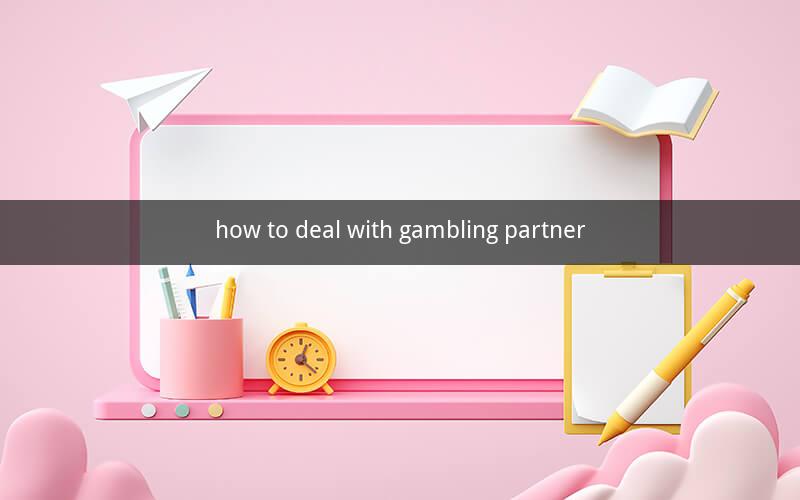
Dealing with a Gambling Partner: Strategies for Support and Healing
Table of Contents
1. Understanding the Problem
2. Communication is Key
3. Setting Boundaries
4. Encouraging Professional Help
5. Financial Management
6. Supporting Emotional Well-being
7. Education and Awareness
8. Building a Support Network
9. Patience and Understanding
10. Focusing on the Relationship
1. Understanding the Problem
Gambling addiction is a complex issue that affects not only the individual but also their loved ones. It's crucial to recognize the signs of a gambling problem, such as secretive behavior, increased financial strain, and neglect of responsibilities. Understanding the nature of the addiction can help in developing effective strategies for dealing with a gambling partner.
2. Communication is Key
Open and honest communication is essential in any relationship, especially when dealing with a gambling partner. Establishing a safe and non-judgmental space for dialogue can lead to a better understanding of each other's feelings and concerns. It's important to express your feelings without placing blame, and to listen actively to your partner's perspective.
3. Setting Boundaries
Setting clear boundaries is crucial in managing the impact of gambling on the relationship. This may involve limiting access to gambling activities, monitoring financial transactions, and establishing ground rules for behavior. Boundaries should be realistic and enforceable, and both parties should be committed to adhering to them.
4. Encouraging Professional Help
Seeking professional help is a significant step towards recovery. Encourage your partner to attend counseling sessions or support groups tailored to gambling addiction. Therapy can provide them with the tools to address the underlying issues contributing to their addiction and develop healthier coping mechanisms.
5. Financial Management
Gambling addiction often leads to significant financial problems. It's important to take control of the financial situation by creating a budget, seeking financial counseling, and addressing any debts. Openly discussing financial concerns can help prevent future issues and promote trust within the relationship.
6. Supporting Emotional Well-being
A gambling partner may experience a range of emotions, including guilt, shame, and anxiety. Providing emotional support can help them navigate these feelings. Encourage them to express their emotions and offer a listening ear. Engaging in activities that promote relaxation and well-being can also be beneficial.
7. Education and Awareness
Educating yourself and your partner about gambling addiction can help both of you better understand the condition. Learn about the signs of addiction, the impact on relationships, and the recovery process. This knowledge can empower you both to make informed decisions and support each other through the challenges ahead.
8. Building a Support Network
Creating a support network can provide additional resources and emotional support. Reach out to friends, family, or support groups that specialize in gambling addiction. Having a network of people who understand the struggles you're facing can make the journey to recovery less daunting.
9. Patience and Understanding
Recovery from a gambling addiction is a gradual process that requires patience and understanding. Avoid pressuring your partner to recover at a pace they're not comfortable with. Recognize that setbacks are a part of the process and be there to offer encouragement and reassurance.
10. Focusing on the Relationship
While addressing the gambling addiction is important, it's equally crucial to focus on the relationship itself. Work on rebuilding trust, reconnecting emotionally, and celebrating the small victories along the way. Remember that the goal is to create a healthier, more fulfilling partnership.
---
Frequently Asked Questions
1. Q: How can I help my partner admit they have a gambling problem?
A: Encourage them to seek professional help and express your willingness to support them through the process. Avoid confrontational tactics and instead focus on your concerns and feelings.
2. Q: What if my partner refuses to seek help?
A: Continue to offer support and resources, but be prepared for resistance. In some cases, it may be necessary to seek help for yourself to cope with the stress and emotional strain.
3. Q: How can I protect myself financially when dealing with a gambling partner?
A: Monitor financial transactions, create a budget, and consider seeking financial counseling. It's important to prioritize your own financial security and well-being.
4. Q: What should I do if my partner's gambling addiction is causing legal problems?
A: Encourage them to seek legal advice and support. In some cases, legal intervention may be necessary to address the addiction and protect both parties.
5. Q: How can I help my partner manage stress without turning to gambling?
A: Encourage them to explore alternative coping mechanisms, such as exercise, hobbies, or therapy. It's important to identify and address the root causes of stress.
6. Q: What if my partner's gambling addiction is causing physical health issues?
A: Encourage them to seek medical attention for any physical symptoms. Addressing health issues can be a crucial step in the recovery process.
7. Q: How can I maintain my own emotional well-being while supporting my partner?
A: Seek support from friends, family, or professionals. Engaging in self-care activities and setting boundaries can help you manage stress and maintain your own mental health.
8. Q: What should I do if my partner relapses after seeking help?
A: Offer understanding and reassurance. Relapse is a common part of the recovery process, and it's important to continue supporting your partner without giving up hope.
9. Q: How can I rebuild trust in our relationship after a gambling addiction?
A: Focus on transparency, accountability, and consistent behavior. Trust is rebuilt over time through small, consistent steps.
10. Q: What resources are available for me and my partner to deal with a gambling addiction?
A: There are numerous resources available, including counseling services, support groups, and financial counseling. Research local options and consider seeking recommendations from professionals.